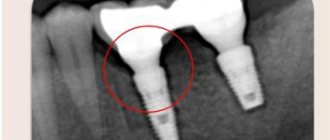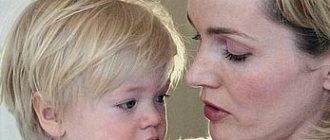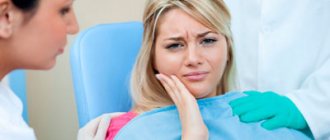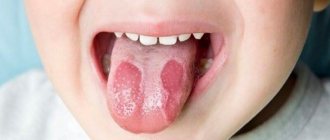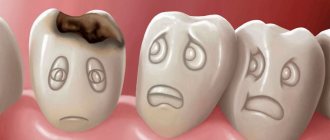15.06.2018
Increased salivation in an adult is a symptom of inflammation or disease of the gums, teeth or internal organs. It is important not only to eliminate excessive salivation, but also to correctly determine its cause, otherwise the recovery will be temporary.
Salivation is considered normal if the volume of saliva does not exceed two liters per day. It is involved in digestion, washing away pieces of food, remnants of drinks and bacterial activity from the teeth. Normally, the process of salivation is invisible to humans - we do not pay attention to it, like, for example, breathing. But if a failure occurs, then too much saliva causes discomfort.
With this disease, saliva accumulates in the mouth too quickly; you constantly have to make sure that it does not leak out and spit. It is inconvenient, unaesthetic, spoils the mood and causes discomfort. In the article we tell you what are the causes of increased salivation in men and women and how to treat it.
Functions of saliva
Saliva is one of the most important components of the digestive system. It is practically colorless and odorless, but has a slightly sour taste. Its production involves the salivary glands located around the jaw. One of the main functions of saliva is the initial digestion of food by softening it during chewing in the mouth before swallowing.
Saliva contains the enzyme amylase, which takes part in the breakdown of starch into simple sugars. Saliva also provides additional disinfection of food and enhances its taste. The autonomic nervous system is responsible for the production of salivary fluid, and the smell and taste of food is responsible for stimulating secretory function.
Salivation has a complex reflex nature
What is hypersalivation?
An adult normally produces a moderate amount of salivary fluid: no more than 1 ml per 5 minutes. If drooling is increased, then significantly more saliva is produced (up to 5 ml during the same time), and a reflexive desire also arises to frequently spit out the secretions accumulated in the mouth.
Usually the sense of taste is reduced, in other cases the sensitivity of tastes may be too sharp or distorted. This mechanism works something like this. A person sees food, and in response to this, the amount of saliva in his mouth increases, especially when he is hungry.
If excessive salivation occurs during sleep or regardless of the feeling of hunger and other factors, it may be associated with disturbances in the functioning of the body, and therefore requires mandatory diagnosis by a doctor. In addition, this is an aesthetic problem, which inevitably causes discomfort in communication and provokes the development of complexes.
Excessive drooling is scientifically called hypersalivation. It comes in the following types:
- true - characterized by too intense production of saliva under the influence of external or internal factors;
- false - the problem lies in the difficulties associated with swallowing it. There are a great many reasons for this: from disorders in the functioning of the brain to injuries in the maxillofacial apparatus.
Increased secretion of the salivary glands occurs in the morning, afternoon and night. So, for example, salivation in the morning is considered a natural phenomenon, but a symptom that occurs mainly at night most often indicates problems in the functioning of the stomach and intestines, and the presence of worms.
Before and during meals, intense production of fluid in the mouth only indicates an increased feeling of hunger and good appetite. When the phenomenon becomes paroxysmal, this may indicate emotional overload.
| Types of hypersalivation | |
| Name | Description |
| True | Intensive work of the salivary glands under the influence of one of the etiological factors. |
| False | Swallowing is impaired. This happens for a number of reasons: disorders in the brain; when the facial muscles are atrophied; when you lose the ability to close your mouth; if the lips are damaged as a result of injury or illness (tuberculosis). |
| Night | The main provocateurs of increased salivation are worms and disorders of the gastrointestinal tract. |
| Daytime | When copious salivation occurs at almost the same time, suspicion falls on a serious disease (heart, blood vessels, kidneys, etc.). |
| Morning | Most often, this phenomenon is considered the norm. |
| During meals, before meals or after meals | Food signals to the brain are associated with feelings of hunger. With this urge, saliva is released profusely. If the phenomenon is observed after eating, then it is worth checking for the presence of parasites in the body. |
| Paroxysmal | The body's response to stress and emotional overload. Excessive excitability affects the functioning of the brain, as a result of which the functioning of the salivary glands is disrupted. |
| Constant | Excessive salivation occurs for several reasons: due to inflammation and irritation of the oral mucosa; in case of digestive disorders; with mumps or inflammation of the salivary glands; due to a foreign body in the mouth. |
Increased salivation in children
In newborn babies, salivation is normally absent due to the underdevelopment of the salivary gland apparatus. However, often a mother may notice how, in the first hours of a child’s life, a colorless liquid, very similar to saliva, is actively secreted from his mouth.
Most often, this is how amniotic fluid comes out, which the baby managed to swallow while passing through the birth canal. Normally, this phenomenon should stop a few hours after birth. If drooling continues longer, it is better to inform your pediatrician (neonatologist) about this in order to exclude serious health problems.
Note: In general, in the first year of life, increased salivation in a child is a normal process.
At the age of about 2 months, a baby may experience profuse salivation, caused by the fact that the salivary glands finally begin to work at full capacity. It is at this age that a child may need his first bib to protect his clothes from getting wet.
Active salivation begins at 2 months of age
Closer to 3 months, children become active explorers of the world around them and taste everything. They put fingers, toys and any other objects at hand into their mouths.
The baby's body becomes acquainted with new microflora, which leads to increased secretion of saliva, which performs a protective function when various bacteria are removed from the oral cavity along with the fluid flowing out of the mouth.
The next time hypersalivation may bother the child during teething, closer to 6 months, and lasts up to 2 years. It is important to note that older children should not suffer from hypersalivation.
If a problem does exist, this may indicate certain disorders, for example, diseases of the nervous system, brain injury, worms, which is why it is extremely important to consult a specialist.
Teething period
Teething usually begins around 6 months of age. The child becomes whiny and irritable. The process of tooth extraction is accompanied by pain and the formation of wounds on the gums. They can greatly disturb the baby, bringing him a lot of suffering.
Salivation helps make pain less intense: saliva has an anti-inflammatory and calming effect. Teething is greatly extended over time and sometimes lasts up to 2 (and even 3) years.
Important! Increased salivation up to 2 years of age is most often caused by natural causes and is physiological.
Causes of increased salivation in adults
Hypersalivation in adults is most often a pathology caused by a number of diseases. Moreover, it occurs with equal frequency in both men and women. Increased salivation always accompanies infectious and inflammatory diseases of the oral cavity and pharynx - stomatitis, gingivitis, periodontitis, sore throat, acute respiratory viral infections.
Stomatitis is an inflammatory disease of the oral mucosa. As a rule, with this disease, the entire oral mucosa is covered with painful ulcers. As a result, it becomes painful to swallow, so the person stops swallowing the resulting saliva.
Gingivitis is no exception, leading to hypersalivation. This disease is characterized by inflammation of the gums. Whether with stomatitis or gingivitis, increased salivation is a protective function in diseases of the oral cavity, allowing timely removal of infectious agents, their toxins and tissue decay products.
This is also why excessive salivation is a sign of an incipient cold. Strong salivation in this case develops in response to mechanical irritation of the nerve endings of the oral cavity.
Disruption of digestive processes. Increased acidity of gastric juice, inflammation and irritation of its mucous membrane can cause a reflex increase in salivation and constant moderate hypersalivation.
With such diseases, increased salivation develops gradually and the patient gets used to the increased amount of saliva, not paying attention to the inconveniences associated with this condition. From the gastrointestinal tract, microorganisms can easily enter the oral cavity, where they irritate the salivary glands and gums and provoke the gradual development of hypersalivation.
Since it develops slowly, a person does not notice excess saliva production. An accurate diagnosis can only be made after fibrogastroduodenoscopy, because the symptoms of these diseases are similar.
With an ulcer, salivation is accompanied by pain and nausea, and most often this occurs on an empty stomach; with gastritis, heaviness and pain appear immediately after eating. Duodenitis leads to the same symptoms, but 1-2 hours after eating. Also, increased salivation in men and women can be observed in acute pancreatitis, caused by excessive production of enzymes by the pancreas.
If bitter belching is added, especially in the morning, the liver and gall bladder should be checked. Saliva can also accumulate in the mouth when there is esophageal spasm, scarring, or tumors that make swallowing difficult.
Involuntary secretion of saliva occurs with facial paralysis (this can also be a symptom after a stroke); in this case, the person cannot swallow at all, even liquid food. Paralysis of the muscular system in the maxillofacial area is a consequence of damage to the facial nerve.
Pathologies of the nervous system. Hypersalivation can also be caused by diseases associated with the central nervous system. Such pathologies include cerebral palsy, Parkinson's disease and its initial stage, irritation of the trigeminal nerve, as well as ailments that cause frequent nausea, such as migraines.
Patients may have problems with swallowing and nasal breathing that are not under their control. Often such patients complain of salivation when talking, which interferes with normal communication with others. A similar situation arises against the background of malfunctions of the vestibular apparatus.
FGDS helps to understand the causes of increased salivation
The main symptom of pseudobulbar or bulbar syndromes. This disease is characterized by damage to the cerebral cortex. As a rule, the amount of saliva produced directly depends on the severity of the disease. With poliomyelitis, syringobulbia or vascular pathologies, patients also experience hypersalivation.
Disorders of the thyroid gland. When the hormonal balance is disrupted, all functions of the organs and systems of the body are disrupted. The symptom can be triggered by diabetes mellitus or hormonal changes - during menopause or puberty.
Chemical poisoning, long-term use of potent medications. The symptom is often caused by long-term drug therapy with potent drugs. The most common drugs that have this effect are nitrazepam, pilocarpine, muscarine, physostigmine and lithium. After stopping the course, the secretion of the salivary glands returns to normal.
Note: It happens that the cause of all troubles is poisoning with iodine, mercury or pesticides.
Causes of hypersalivation in men
Increased salivation in men can be caused by all of the reasons listed above, but there is one more factor. As a rule, men are more likely than women to abuse bad habits, among which smoking and drinking alcohol are the leading ones. Inhaling smoke containing nicotine and tar has a negative impact on the condition of the oral cavity.
The mucous membrane is constantly injured. To reduce irritation, the salivary glands reflexively begin to produce more fluid - this increases the amount of saliva produced. Because of this, hypersalivation is especially common among smokers. If a person quits smoking, then salivation, after a certain time, returns to normal.
Why do women salivate?
For many women, the cause of hypersalivation is pregnancy, or more precisely, the resulting toxicosis. According to experts, it is in the early stages of pregnancy that many women notice primary signs of hypersalivation.
Increased salivation may accompany early toxicosis of pregnancy
The thing is that a woman is constantly trying to suppress attacks of nausea and vomiting, thereby she begins to involuntarily swallow less often. As a result, there is a feeling that there is actually more saliva than there should be. Heartburn often accompanies increased salivation during pregnancy.
In this case, the body conditionally receives a signal to soften the acid with saliva, which, due to its high bicarbonate content, is classified as an alkaline environment. Sometimes hypersalivation occurs due to the same factors as in ordinary adults. In such a situation, pregnant women are advised to inform their doctor about this to rule out obvious causes of the problem.
Another reason for increased salivation in women is the onset of menopause. In this case, it is accompanied by severe sweating and frequent flushes of blood. This is a natural process that will gradually disappear.
How is the problem treated today?
Now let's move on to questions about what to do if there are obvious signs of hypersalivation, how to reduce the intensity of saliva production and eliminate the symptom in a child or adult. As mentioned above, before treating the problem, you need to undergo appropriate diagnostics. Further therapy directly depends on the source of all troubles. In different situations, antihelminthic, dental treatment, or therapy aimed at restoring the functioning of the gastrointestinal tract can be used. It is also worth highlighting certain techniques that can be used in the fight against hypersalivation:
- drug treatment using drugs whose action is aimed at reducing the production of salivary fluid, for example, Riabal or Platifillin,
- surgical removal of part of the salivary glands,
- radiation therapy,
- Exercise therapy and facial massage are effective for neuralgia,
- Botox injections into the salivary glands to stop secretion for about six months.
Botox injections will help get rid of the problem for half a year.
Separately, you need to say a few words about hyposalivation, that is, a decrease in the functionality of the salivary glands, which causes the patient to experience dryness of the oral mucosa, problems with swallowing and speech function. This condition also has many potential prerequisites that can lead to abundant formation of plaque and stone, and minor trauma to soft tissues. In such a situation, you need to consult a doctor to determine the exact cause. Answering the question about how to increase salivation with dry mouth, experts advise making chewing movements more often, chewing food thoroughly and drinking more fluids. If a pathological condition is to blame, appropriate treatment will be required.
Increased saliva production during sleep
When a person sleeps, saliva production slows down and becomes less intense. But sometimes the salivary glands “wake up” before their owner, and then in the morning you can find a wet spot on the pillowcase. If this is only a periodic phenomenon, there is nothing to be afraid of (for example, when a person has a runny nose or a cold).
However, such a symptom can also be the result of an incorrect bite or loss of part of the teeth - here you need the help of a dentist. Normally, in a healthy person, salivation decreases sharply at night. A couple of drops of saliva on the pillow in the morning is just evidence that the body woke up earlier than its owner.
Factors that provoke excessive salivation during sleep:
- mouth breathing;
- malocclusion, in which the mouth remains open at night - for example, with open, mesial and distal bites;
- sleep disturbances - for example, too deep sleep, similar to an unconscious state, during which control over the body is completely lost.
A wet pillow in the morning can be either normal or a symptom of a serious illness.
Complications and prevention
The consequences of ignoring such a symptom can be:
Symptoms of salivary gland disease
- violation of adequate taste perception, food aversion;
- sudden weight loss;
- dehydration of the body;
- psycho-emotional disorders, insomnia;
- deterioration of the condition and color of the skin due to the constant influence of saliva and the bacteria in it;
- infectious lesions.
In order to prevent pathologies that provoke increased salivation, it is recommended to follow the following rules:
- perform hygiene procedures in a timely manner, including the oral cavity;
- once every six months, undergo a preventive examination at the dentist, have your teeth professionally cleaned;
- review your diet, use more fresh vegetables and fruits to enrich the body with vitamins and microelements (you should give up salty, smoked and fatty foods);
- lead an active lifestyle, relax in nature, visit fitness centers;
- to refuse from bad habits.
If excessive salivation is a symptom of any disease, you need to undergo medication prescribed by your doctor. Eliminating the problem in this case depends on complete recovery.
A healthy lifestyle is an excellent prevention of increased salivation
Preventive measures
The manifestations of hypersalivation can be avoided if you take a responsible approach to the health of the oral cavity and the body as a whole. It is important to pay attention to the prevention of diseases that can lead to excess secretion of the salivary glands. First of all, you need to ensure high-quality oral hygiene, regularly visit the dentist’s office for preventive examinations, eat right and lead a healthy lifestyle. If signs of infectious infection, diseases of the teeth and gums, or disturbances in the gastrointestinal tract are detected, you should urgently contact an appropriate specialist.
- Leontiev V.K. Changes in the structural properties of saliva with changes in pH, 1999.
Diagnostics
Initially, with complaints of increased salivation, the patient should contact a therapist or pediatrician. If necessary, other highly specialized specialists are involved in the diagnostic search: neurologist, phlebologist, cardiologist, endocrinologist, infectious disease specialist, oncologist, gastroenterologist, dentist.
The survey usually involves the following steps:
- External examination, finding out in a conversation with the patient or his relatives about the time of the problem, the presence of concomitant diseases, and other signs of the disease.
- Exclusion of other pathologies, the symptom of which may be hypersalivation. In children, it is important to distinguish ptyalism, as a symptom of teething, from ARVI.
- Identifying signs confirming the disease. For this purpose, laboratory blood tests, functional tests, and bacteriological seeding of biological material are carried out.
- Hardware diagnostic methods include X-ray, computed tomography, magnetic resonance imaging, ultrasound scanning of the affected organ, electroencephalography of the heart, and Doppler ultrasound of blood vessels.
- Additional examination by a dentist, psychiatrist and neurologist to identify possible indirect causes.
Which specialist should I contact for help?
If copious salivary secretions are washed off into the mouth, and the symptom does not go away during the day, you need to consult a specialist. The problem may well indicate some kind of internal disorder, so the sooner you react, the higher the chance of starting treatment on time, without waiting for complications to develop. In such a situation, you need to consult a dentist or therapist. After the initial examination and diagnosis, if necessary, the doctor will redirect you to a specialized specialist, for example, a gastroenterologist, parasitologist, etc.
